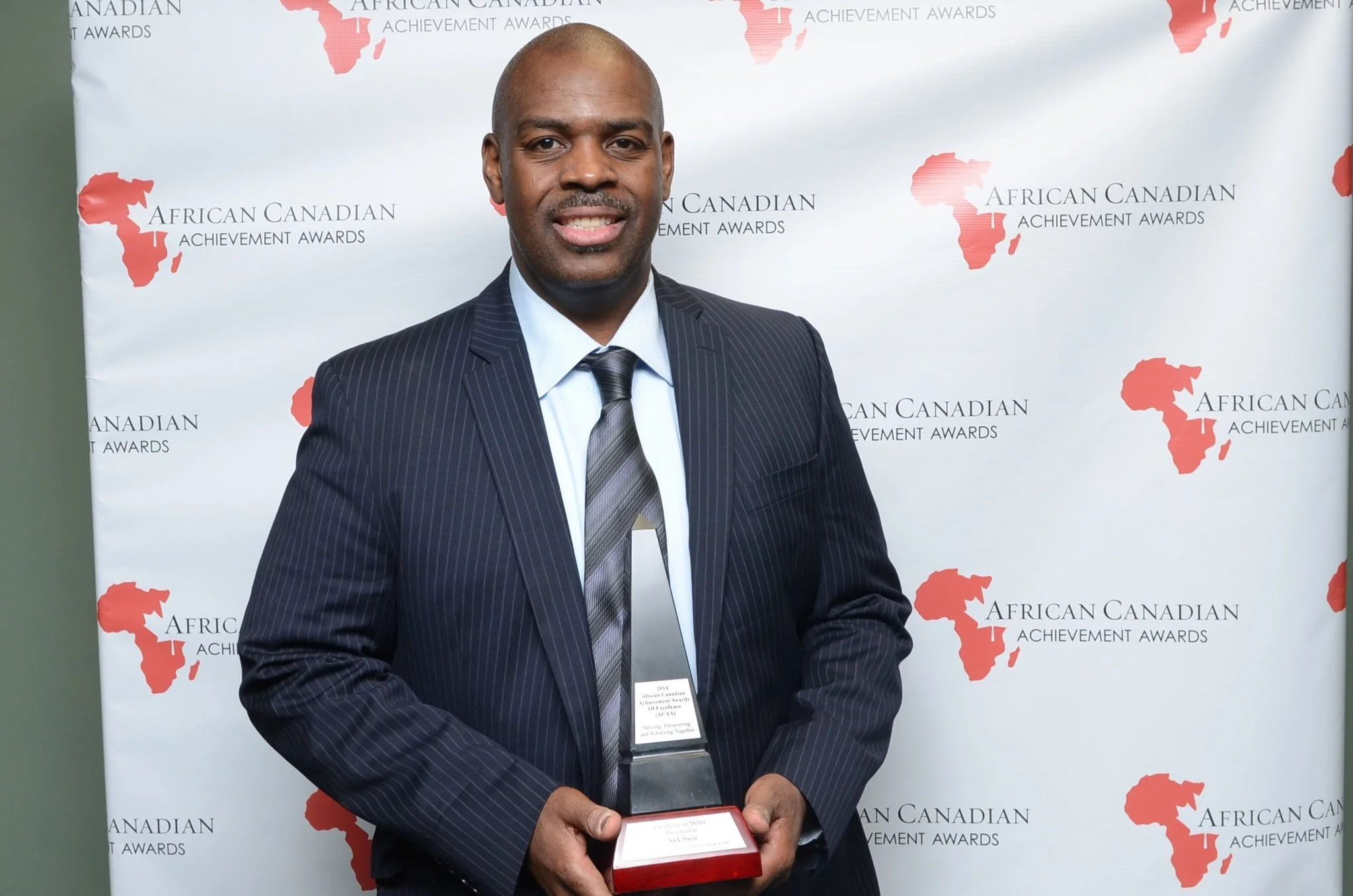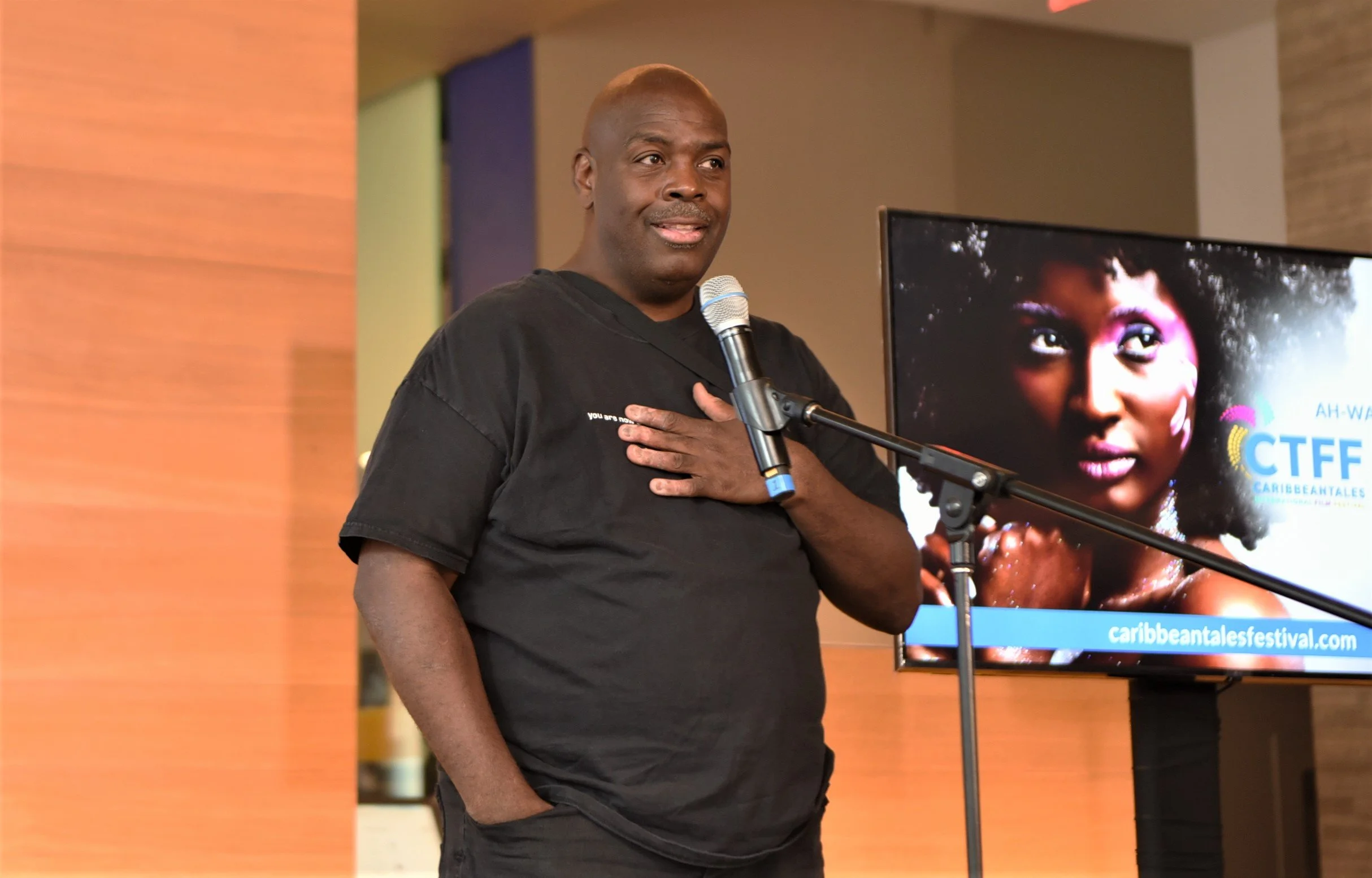Nick Davis celebrated with Reelworld Film Festival Visionary Award
December 6, 2022
Entering university, journalism was not a career consideration for Nick Davis.
“Somehow, I skated through life up to that point being good in Math and not good in anything else,” he recounted. “When I took my electives, I was not a strong writer and I got some very strong feedback from one of my English teachers in my first-year in university.”
That prompted Davis to take writing courses.
He also joined York University’s newspaper ‘Excalibur’ and its community radio station, ‘CHRY 105.5 FM’.
“I got the opportunity to write news stories and scripts,” said Davis. “I was not very good at it in the first-year. But by the third year, I became ‘Excalibur’s’ Editor-in-Chief and I was doing a music and talk show on radio.”
At graduation in 1994, he had job offers from Word Magazine, Toronto Sun and the Jamaica North America Gleaner that he chose.
He later joined Word Magazine as an Editor and his column caught the attention of then CBC Executive Producer Phil Dugas.
“He liked what I was writing and wanted to meet me,” Davis said. “He brought me in to meet some people at CBC and, a week later, Julie Lyons offered me a contract job.”
He was hired full-time a year later as a National Sports Reporter.
Davis has held several senior roles with the national public broadcaster in the last two decades, including Radio One Metro Morning Senior Producer, Director of Program Development & Workforce Planning and Director of Engagement & Inclusion, English Services.
He was appointed Executive Director of Equity & Inclusion in April 2021.
Last October, Davis was the recipient of the Reelworld Film Festival Visionary Award presented to individuals working behind the scene to promote diversity at all levels.
“The award validates some of the crazy ideas I have had my whole life about this business we work in, how I see it, how I hear it and how I envision it in the now,” he told CBC Radio Personality Matt Galloway in an interview after receiving the award. “I am also a risk taker which, I think, is being part of a visionary. I see the future of this business in a different way than probably most people and I am happy to know there are people who recognize that.”
Davis is the first to admit there was a time when he had a narrow understanding of other cultures.
“I didn’t have this deep understanding of Indigenous people, those with disabilities or people from the LGBTQ2+ communities,” he said.
That perspective changed in the late 1980s when Davis hosted a multicultural cable television show, ‘Canadian Spectrum’, on Rogers Television Cable 10.
“That program was all about reflecting Canada back to itself,” he said. “I got a lot of those experiences in the year-and-a-half to meet people and understand them. We always tried on that show to be reflective as we could because we felt there were things people could learn about other people. At that time, we were trying to open up a window to other people’s world so that people could understand them better.
“It was a cool show and I really enjoyed it. All the journalism I did after that has always been around educating people about other people’s experiences. We need to appreciate other people journeys so that we understand where they are coming from and why we see the world differently. Meeting people and understanding them forced me to do research and some more learning and I have been on that journey ever since where I make sure I am doing my journalism through a lens of inclusion.”
Nick Davis was a 2014 African Canadian Achievement Award winner (Photo by Ron Fanfair)
At the start of Davis’ CBC career, there were some growing pains.
“I had an opportunity to pitch ideas and stories I thought were interesting and I remember being told that is not a CBC story,” he recalled. “When I inquired why, I was asked if ‘so and so’ from Manitoba would be interested in it. I said ‘no’, but maybe Kwame in Rexdale might be interested in it and why aren’t we as interested in Kwame’s story as that person in Saskatchewan. I challenged that a lot and they were open to what I was saying. They allowed me to tell some cool stories about people from my community who were doing really interesting things in the sports world and telling it through the lens of what it means to be a Black athlete.”
When Davis joined ‘Metro Morning’ that became the city’s highest-rated program in its timeslot, he pushed for inclusive programming.
“I thought we live in this city that was changing at the time and everytime I turned on the radio station of the show I liked, it didn’t sound like the city I lived in,” he said. “Part of my goal was to make it sound that way. To do that, we had to get different perspectives at the table. It is the same stories that we would normally cover, but just told through a different lens. I want everyone who touches CBC to have a great experience. To do that, we have to make sure that the place that we create for them to have that is inclusive and welcoming. They must feel respected, heard and valued.”
The main fear, he said executives had at the time, was that CBC would lose its core audience.
“I pointed out to them that we didn’t have a lot of core audience and we were not doing very well in ratings,” he pointed out. “They thought that in the attempt to grow audience, that somehow we would lose the current audience we had. I disagreed with that sentiment and I had a hard time convincing people of that. The plan was not to play Reggae music, which I like, 24 hours. It was to tell stories through a different lens.”
What is Davis’ biggest challenge as a media executive?
“It is still education and making sure people understand the work we do and the value of it,” the Caribbean Tales Film Festival Incubator mentor said. “A White man told me the other day he has no future at CBC because we are not hiring White people anymore in leadership jobs. I thought, ‘Wow, I could show you the hiring stats and they actually speak to the complete opposite of what you are saying’.
“I understand why that person may feel that way because there is such an emphasis on this work at CBC that, I think, is a good thing. The challenge for me is to make people think that somehow we are not excluding somebody else. Part of my whole thing is about inclusion and I want to make everybody feel included. I don’t feel good when other people feel like they are excluded. Making people understand the value of the work they do is my biggest challenge.”
Last December, Davis and his team partially funded the Pathways Initiative that is a developmental program for diverse emerging journalists who don’t have formal journalism backgrounds or experience in a Canadian newsroom.
Since 2011, Nick Davis has been a Caribbean Tales Film Festival Incubator mentor (Photo by Ron Fanfair)
Outside of journalism, Davis has a passion for basketball.
An outstanding high school player at The Woodlands in Mississauga, he planned to try out for York University. That aspiration ended when he broke his leg in three places while working at a construction site.
While recovering from the injury and knowing he would not play in university, a friend (Eugene Gibson) started a summer league in Brampton in 1987 and was looking for coaches.
“He volunteered me and a couple of guys to coach even though I knew nothing about coaching basketball,” said Davis. “Somehow, my team won the league tournament and I don’t know how because it had nothing to do with me. We had very good players. It was then that I decided I should take coaching seriously because I love the sport.”
A Sheridan College Assistant Coach since 1995 and a member of Canada’s national coaching pool for the last decade, he travelled to Spain, Argentina and France as an Assistant Coach with the National Cadet team between 2014 and 2016.
After attending several coaching clinics and camps, he created a team – Nappy’s – that included former Canadian players Sherman Hamilton and Michael Meeks and 2003 Sheridan College Hall of Fame inductee George Frempong.
At a very young age, Davis’ father passed away.
Just before becoming a teenager, a father figure – maternal uncle Hopeton Malabre -- came into his life and steered he and his siblings in the right direction.
“He is a Rastafarian, a morally solid person with some strong spiritual beliefs and principals,” the 2014 African Canadian Achievement Award of Excellence winner said. “He challenged me and my brothers’ everyday about doing the right thing. He kind of give us the morale fibre to do what we do and I think about it every day.”
Davis started university in 1984, but left after two years to work for Canada Border Services Agency. He returned to York in 1991 to complete his degree.








